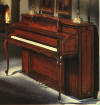The difference between Grade 1 through Grade 6 is
between $800 and $3,000 for models shown.
- Difference in tone
was subtle from model to model
- Difference in the
touch is noticeable between Grade 1 -2-3 and
4-5-6.
- Biggest difference
was in furniture styling and finish.
One
important consideration is the amount of dealer preparation the
instrument is even placed on the showroom floor.
This can add as much as $300 to the price of the piano, worth the cost and
will add years of use to the instrument.
An important difference between these
pianos is the amount of time spent in assembling the various parts into the case
and bringing individual instruments up to their final tone quality. Pianos
manufactured in this traditional manner may take from nine months to a year to
put on the finishing touches. New verticals will of this kind generally run
about $3000 more depending on the style and finish.
Every piano has a individual character of its own
as well. This pedigree that sets it
apart, even from instruments of the same make and style, is inevitable. No two
trees ever grow exactly alike. Grains and densities differ between species and
between individual trees of the same species. Plastics used in the keys differ
in color by different batches. Wool, from which hammer and damper felts are
made, vary in texture and length of fiber. Variations are present in all
materials from which pianos are made.
Some manufactures signify the difference in market share or 'price point' pianos with different
model numbers Yamaha makes the same quality of musical instrument with
different cabinetry while Baldwin uses different brand names example: Howard,
Hamilton, Acrosonic, Ellington, Monarch and so on.
BALDWIN ELLINGTON
BALDWIN VERTICAL PIANO SPECIFICATIONS
Each model number or brand name is a market
share or "price point" that is with more or less features than other models by
the same manufacturer. Some of the pianos are larger, smaller, fancy and
plain.
YAMAHA EXAMPLE
You can see difference from across the room. But when you go to sell your piano or
trade it in, the only way is by knowing which piano is best and what features
offer benefits that absolutely makes it a better piano and worth more.





